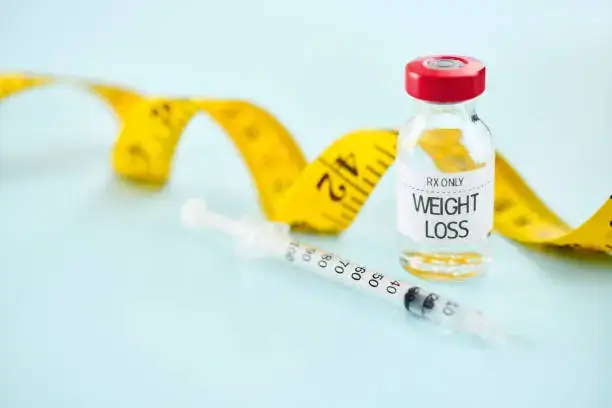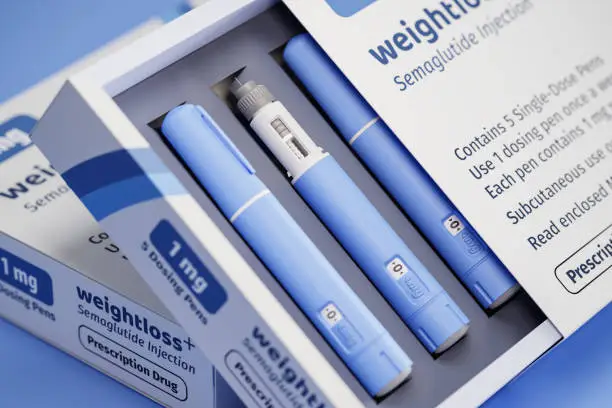We envision a world where everyone has the tools and knowledge to live a balanced, healthy, and fulfilling life. By providing reliable resources, personalized programs, and community support, we aim to be a beacon of hope for those on their health journey.
Table of Contents
Introduction to Weight Loss Injections

Weight loss injections represent a burgeoning avenue in the realm of weight management, capturing the attention of individuals seeking effective solutions for their weight loss journeys. These injectable treatments utilize various substances that, when administered, contribute to fat reduction and appetite control. Read about: How Fast Do You Lose Weight on Wegovy; The increasing prevalence of obesity and related health issues has accentuated the need for effective weight loss strategies, thereby propelling the popularity of weight loss injections in recent years.
Generally, weight loss injections work by altering hormonal balances, increasing metabolic rates, or promoting satiation. One of the primary mechanisms involves the use of peptide hormones, which can enhance dopamine receptor sensitivity, consequently leading to reduced cravings. Numerous clinical studies have demonstrated that such injections, when combined with dietary changes and physical activity, may yield advantageous results that support sustainable weight loss.
Several types of weight loss injections are currently available, each varying in active ingredients and mechanisms of action. Common examples include Glucagon-like Peptide-1 (GLP-1) agonists, such as Semaglutide and Liraglutide, which mimic gut hormones to regulate appetite. Additionally, B12 injections are sometimes utilized, believed to play a role in energy metabolism and mitochondrial function, thereby potentially enhancing weight loss efforts.
As the market for weight loss solutions continues to expand, the support of healthcare professionals and proper patient education is vital to ensure that individuals make informed choices. While these injections present promising prospects for weight loss, it is equally essential to approach them with caution and a thorough understanding of their benefits, risks, and suitability.
How Weight Loss Injections Work
Weight loss injections are designed to assist individuals in their weight loss journey through specific biological and biochemical mechanisms. The components within these injections typically aim to influence appetite, metabolism, and fat reduction. Understanding how these mechanisms function can provide valuable insights into the effectiveness of weight loss injections.
One of the primary ways weight loss injections work is through appetite suppression. Many of these injections contain hormones such as glucagon-like peptide-1 (GLP-1) that signal the brain to reduce hunger. By mimicking our body’s natural hormones that regulate hunger and satiety, these injections encourage individuals to consume fewer calories, which is crucial for weight loss.
Another mechanism involves the enhancement of metabolism. Certain weight loss injections can increase the body’s metabolic rate, leading to more calories being burned throughout the day. This is often achieved through the inclusion of compounds like human chorionic gonadotropin (hCG) or other stimulants. Enhanced metabolism not only aids in weight loss but also improves overall energy levels, making physical activity feel less demanding.
Moreover, some weight loss injections specifically target fat burning. These formulations often contain lipotropic agents, which play a significant role in the breakdown of fat in the liver. By promoting the mobilization and oxidation of fat, these injections help the body utilize stored fat as energy, thus facilitating further weight loss.
In conclusion, weight loss injections operate through a combination of appetite control, metabolism enhancement, and targeted fat burning. By understanding these scientific principles, individuals can make informed decisions regarding their weight loss options, leading to healthier outcomes in their pursuit of weight management.
Types of Weight Loss Injections

Weight loss injections can be classified into several categories based on their composition and mechanism of action. Understanding these types is crucial for individuals considering this approach to managing their weight.
One prominent class of weight loss injections includes GLP-1 agonists, such as liraglutide and semaglutide. These injections mimic the glucagon-like peptide-1 hormone, which plays a significant role in regulating appetite and food intake. By acting on the brain’s appetite center, GLP-1 agonists help individuals feel full sooner, which can lead to reduced calorie consumption. They are particularly appropriate for individuals with obesity or weight-related health issues who are seeking medical interventions to aid in weight loss.
Another category is lipotropic injections. These injections typically contain a combination of amino acids, vitamins, and other nutrients designed to promote fat metabolism. Ingredients such as methionine, inositol, and choline aim to enhance the liver’s ability to process fats, thereby potentially supporting weight loss efforts. Lipotropic injections may be suitable for individuals looking for an additional boost alongside traditional weight loss methods, such as diet and exercise.
Additionally, hormonal injections like HCG (human chorionic gonadotropin) have gained popularity in the realm of weight loss. These injections are thought to aid in fat loss while preserving lean muscle mass. However, the efficacy and safety of HCG for weight loss remain subjects of debate within the medical community. It is essential for potential users to consult health professionals before considering such options.
Understanding the various options available in weight loss injections allows individuals to make informed decisions about which methods align with their health goals. Factors such as medical history, lifestyle, and personal preferences should be carefully considered in choosing the most appropriate type.
Benefits of Weight Loss Injections
Weight loss injections offer a range of potential benefits that can appeal to individuals seeking effective solutions for weight management. One of the primary advantages is the accelerated weight loss they may facilitate. Many patients report achieving noticeable results in a shorter time frame compared to traditional methods, such as diet and exercise. This rapid progress can serve as a motivating factor, encouraging individuals to continue pursuing their weight loss goals.
Another significant benefit of weight loss injections is their positive impact on metabolic health. Many injections are designed to improve insulin sensitivity, regulate appetite, and enhance fat burning processes within the body. These metabolic improvements can lead not only to weight reduction but also to better overall health. For instance, individuals with pre-existing metabolic conditions, such as type 2 diabetes, may find that weight loss injections contribute to improved glucose levels and reduced risk of complications.
The convenience of injectable medications is another compelling reason why many people are turning to weight loss injections. Unlike traditional weight loss methods, which often require intense dedication to diet regimens and exercise schedules, injectables can provide a more straightforward approach. Patients can easily incorporate these injections into their routines, minimizing disruptions to their daily lives. Moreover, medical professionals often monitor patients receiving these injections, providing an added layer of support and accountability.
Personal stories from individuals who have used weight loss injections illustrate these benefits effectively. Many users report significant transformations, not only in their physical appearance but also in their mental well-being and self-confidence. These testimonials highlight the comprehensive benefits associated with weight loss injections, making them a compelling option for individuals facing challenges in achieving their weight loss goals through conventional means.
Risks and Side Effects

Weight loss injections can offer a novel approach to managing body weight; however, it is essential to be aware of the associated risks and potential side effects. Common side effects experienced by individuals may include nausea, diarrhea, constipation, and headaches. These symptoms can be bothersome and may vary in intensity from person to person. In most instances, these side effects tend to lessen over time as the body adjusts to the treatment.
More serious health risks can, though rarely, occur with weight loss injections. Some individuals may experience allergic reactions, which could manifest as hives, swelling, or difficulty breathing. In extreme cases, these reactions could lead to anaphylaxis, a life-threatening condition requiring immediate medical attention. Moreover, particular weight loss injections may affect metabolic processes and hormone regulation, raising concerns regarding their long-term safety and efficacy.
It is crucial to emphasize the importance of consulting healthcare professionals before starting any weight loss injection regimen. A qualified healthcare provider can assess an individual’s medical history, evaluate their current health status, and discuss potential risks associated with specific injections. This professional guidance ensures that individuals choose a weight management approach that is safe and suitable for their specific circumstances.
Individuals considering weight loss injections must weigh the potential benefits against these risks and be vigilant about monitoring any adverse effects during treatment. Establishing open communication with healthcare providers not only aids in minimizing risks but also enhances the overall safety of the weight loss journey.
Criteria for Choosing Weight Loss Injections
When considering weight loss injections, several critical factors must be taken into account to ensure that the chosen method aligns with an individual’s unique health profile and objectives. First and foremost, one’s current health status should be thoroughly assessed. This includes evaluating any existing medical conditions, medications currently being taken, and potential contraindications that could arise from using weight loss injections. Individuals with a history of specific health issues, such as cardiovascular conditions, diabetes, or hormonal imbalances, should consult with a healthcare provider to determine the appropriateness of these treatments.
Next, it is essential to define clear and attainable weight loss goals. Understanding personal motivation for weight loss can play a significant role in choosing the right method for weight management. Those seeking significant weight reduction may benefit from different types of injections than someone looking to make minor adjustments to their weight. Establishing realistic expectations regarding the rate of weight-loss and the sustainability of results is vital. Individuals should ask themselves whether they seek rapid results or prefer a gradual weight-loss approach, which might affect the choice of injection type.
Consultation with healthcare providers is perhaps the most critical step in the decision-making process. A qualified professional can provide personalized recommendations based on an individual’s health background and weight-loss goals. This might include discussing alternatives like lifestyle changes, dietary adjustments, or combining injections with other weight-loss strategies for a more holistic approach. Additionally, healthcare providers can highlight potential side effects and benefits associated with different injection options, empowering individuals to make informed choices tailored to their personal needs. Ultimately, careful consideration of these factors can lead to successful and safe weight-loss injection outcomes.
Success Stories and Testimonials

Weight-loss injections have garnered significant attention in recent years, with many individuals sharing their personal success stories. These testimonials not only illustrate the effectiveness of such treatments but also provide insight into the diverse experiences that accompany each weight-loss journey. One case that stands out is that of Sarah, a 34-year-old mother of two, who struggled with weight management following her pregnancies. After researching various options, she opted for weight loss injections combined with lifestyle changes. Within six months, Sarah reported a loss of 30 pounds, feeling more energized and confident in her daily activities. Her story serves as inspiration for many who may feel overwhelmed by their weight-loss challenges.
Another powerful testimonial comes from Jacob, a 45-year-old who faced health complications due to obesity. Jacob started receiving weight-loss injections under medical supervision, which he complemented with a structured diet and exercise regimen. In just a year, he managed to shed 50 pounds, significantly improving his overall health markers. Jacob’s experience highlights the importance of a holistic approach to weight-loss; he credits the injections with jumpstarting his journey, allowing him to build momentum towards a healthier lifestyle.
A more recent success story features Elena, a young professional who had battled weight gain due to a sedentary lifestyle and high-stress job. After consulting with a healthcare provider, she began weight loss injections as part of a comprehensive weight management plan. Over nine months, she lost 40 pounds and, more importantly, reported improvements in her mental well-being. Elena’s journey underscores the positive psychological effects that successful weight-loss can have, encouraging others to consider similar paths.
These narratives exemplify the potential benefits of weight-loss injections, showcasing diverse outcomes that are often achieved through a combination of medical and personal dedication. While results may vary, many individuals have found hope and success through this approach, paving the way for further exploration into effective weight-loss options.
Alternatives to Weight Loss Injections
Weight-loss injections have gained attention for their effectiveness in helping individuals shed excess pounds. However, various alternatives can also facilitate weight-loss, offering a range of approaches that may be more suitable or appealing to different individuals. Diet and exercise remain fundamental components of any weight management plan. A balanced diet, rich in whole foods, fruits, vegetables, lean proteins, and healthy fats, supports overall health while promoting weight reduction. Tailoring one’s caloric intake to create a sustainable caloric deficit can significantly enhance weight-loss efforts.
Incorporating regular physical activity is equally crucial. Engaging in aerobic exercises, strength training, or even low-impact activities such as walking or swimming can help burn calories and build muscle, further assisting in weight management. The physical activity guidelines recommend at least 150 minutes of moderate-intensity aerobic exercise each week, alongside muscle-strengthening activities on two or more days per week. These lifestyle changes can produce significant weight-loss results over time when adhered to consistently.
Additionally, other medical treatments may be explored as alternatives. Prescription medications for weight-loss are available for individuals with specific health conditions or those who have struggled with lifestyle interventions alone. These medications work by suppressing appetite, reducing absorption of nutrients, or increasing feelings of fullness. It is essential to consult with a healthcare provider to assess suitability, potential side effects, and proper usage. Furthermore, individuals might consider behavior therapy, which focuses on changing habits related to eating and physical activity. This therapeutic approach often involves working with a psychologist or counselor to develop personalized strategies for long-term success.
Exploring these alternative methods for weight-loss can empower individuals to choose the most effective and sustainable approach suited to their goals and lifestyle. Each method presents unique benefits and challenges, emphasizing the importance of finding a balance that fosters not only weight-loss but overall health and well-being.
Conclusion and Takeaway
In light of the information presented regarding weight-loss injections, it is essential to comprehensively understand both the benefits and potential risks associated with these treatment options. Weight-loss injections can offer a viable solution for individuals struggling with obesity or those who wish to lose- weight effectively. Various formulations, such as GLP-1 receptor agonists and other injectable medications, have been shown to assist in weight-loss by controlling appetite and managing blood sugar levels. However, their efficacy often requires a commitment to lifestyle changes, including diet and exercise.
On the other hand, the risks involved should not be overlooked. Some individuals may experience side effects ranging from mild to severe, including gastrointestinal issues, potential allergic reactions, or complications arising from improper use. Moreover, weight-loss injections are not suitable for everyone, and a proper evaluation by a healthcare professional is crucial to determine eligibility. Individual health circumstances, pre-existing conditions, and potential interactions with other medications must be thoroughly considered before embarking on this weight management strategy.
It is advisable for those considering weight-loss injections to engage in a candid discussion with their healthcare provider. This discussion should encompass an analysis of their health status, personal weight- loss goals, and alternative weight management methods that may be more appropriate based on their overall lifestyle and health condition. By taking a well-informed approach, individuals can navigate the weight-loss landscape more effectively, ensuring that they select the option best suited to their needs and circumstances.
Ultimately, while weight-loss injections present unique opportunities for achieving weight loss, understanding the broader context of health is vital. Recognizing personal health factors and consulting with an expert will empower individuals to make the best choices regarding their weight-loss journey.
Did You Try this tips ?
There are no reviews yet. Be the first one to write one.
blood work brain health cancer treatment climate health diabetes treatments digestive health disease management disease mapping exercise plan fitness tips gut health hair care hair growth hair treatment health foods health insurance health tips healthy habits healthy recipes heart disease home workouts immune boost immune foods keto plan keto recipes kidney disease lifestyle diseases meal delivery medicine innovation melanoma treatment mental health morning exercise natural remedies non melanoma nutritional advice nutrition assistance raw nutrition skin cancer skin care skin health sleep exercise sleep technology telemedicine services viral threats weight loss







